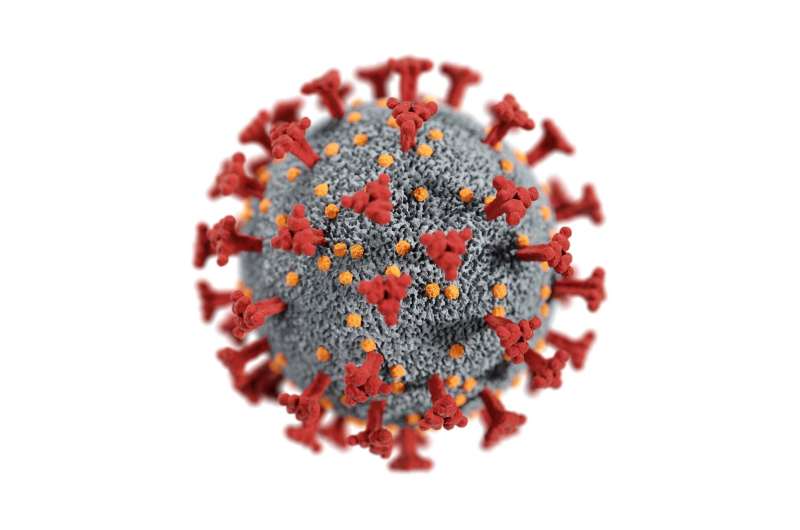

People who have received two vaccine doses against COVID-19 have a lower, but still appreciable, risk of becoming infected with the delta variant compared with unvaccinated people. Vaccinated people clear the infection more quickly, but the peak viral load among vaccinated people is similar to that seen in unvaccinated people, which may explain why they can still readily pass on the virus in household settings, according to a study published in The Lancet Infectious Diseases.
Vaccines remain highly effective at preventing severe disease and deaths from COVID-19, but some studies suggest they may be less effective against the delta variant—currently the dominant strain worldwide—though the reason for this has not been established. Most COVID-19 transmission is known to occur in households yet there is limited data on the risk of transmission of the delta variant from vaccinated people with asymptomatic or mild infections in the community.
Professor Ajit Lalvani of Imperial College London, UK, who co-led the study, said that “vaccines are critical to controlling the pandemic, as we know they are very effective at preventing serious illness and death from COVID-19. However, our findings show that vaccination alone is not enough to prevent people from being infected with the delta variant and spreading it in household settings. The ongoing transmission we are seeing between vaccinated people makes it essential for unvaccinated people to get vaccinated to protect themselves from acquiring infection and severe COVID-19, especially as more people will be spending time inside in close proximity during the winter months. We found that susceptibility to infection increased already within a few months after the second vaccine dose—so those eligible for COVID-19 booster shots should get them promptly.”
The new study enrolled 621 participants, identified by the UK contact tracing system, between September 2020 and September 2021. All participants had mild COVID-19 illness or were asymptomatic. Demographic and vaccination status information were collected on enrolment, and participants had daily PCR tests to detect infection, regardless of whether or not they had symptroms. It is one of the few studies to date conducted using such detailed data from real households, offering key insights into how vaccinated people can still be infected with the delta variant and pass it on to others.
In this study, participants were defined as unvaccinated if they had not received a single COVID-19 vaccine dose at least seven days before enrolment, partially vaccinated if they received one dose more than seven days before enrolment, and fully vaccinated if they received two doses more than seven days beforehand. The study took place before vaccine boosters had become widely available.
Risk of transmission based on vaccination status was analyzed for household contacts exposed to delta variant index cases (the first detected case in a household). By performing PCR tests on swab samples provided daily by each participant for 14–20 days, changes over time in viral load—the amount of virus in a person’s nose and throat—were estimated by modeling PCR data, enabling comparisons between fully vaccinated cases of delta infection, and unvaccinated cases of delta, alpha, and pre-alpha infection.
A total of 205 household contacts of delta variant index cases were identified, of whom 53 tested positive for COVID-19. Of the 205 contacts, 126 (62%) received two vaccine doses, 39 (19%) had received one vaccine dose, and 40 (19%) were unvaccinated. Among household contacts who had received two vaccine doses, 25% (31/126 contacts) became infected with the delta variant compared with 38% (15/40) of unvaccinated household contacts.
Among vaccinated contacts infected with the delta variant, the median length of time since vaccination was 101 days, compared with 64 days for uninfected contacts. This suggests that the risk of infection increased within three months of receiving a second vaccine dose, likely due to waning protective immunity. The authors point to vaccine waning as important evidence for all eligible people to receive booster shots.
A total of 133 participants had their daily viral load trajectories analyzed, of whom 49 had pre-alpha and were unvaccinated, 39 had alpha and were unvaccinated, 29 had delta and were fully vaccinated, and 16 had delta and were unvaccinated. Viral load declined more rapidly among vaccinated people infected with the delta variant (0.95 log10 virus copies/mL/day) compared with unvaccinated people with delta (0.79), alpha (0.82), or pre-alpha (0.69). However, the authors note that vaccinated people did not record a lower peak viral load than unvaccinated people, which may explain why the delta variant can still spread despite vaccination as people are most infectious during the peak viral load phase.
Dr. Anika Singanayagam, co-lead author of the study, said that “understanding the extent to which vaccinated people can pass on the delta variant to others is a public health priority. By carrying out repeated and frequent sampling from contacts of COVID-19 cases, we found that vaccinated people can contract and pass on infection within households, including to vaccinated household members. Our findings provide important insights into the effect of vaccination in the face of new variants, and specifically, why the delta variant is continuing to cause high COVID-19 case numbers around the world, even in countries with high vaccination rates. Continued public health and social measures to curb transmission—such as masking wearing, social distancing, and testing—thus remain important, even in vaccinated individuals.”
Source: Read Full Article